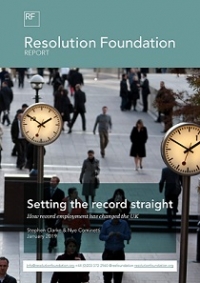The Resolution Foundation Produces a New Report On Employment
Tuesday 15 January, 2019 Written by Simon Collyer
The Resolution Foundation has produced a new report:
Setting the record straight: How record employment has changed the UK.
These are the key findings:
First, is the employment boom all about migrant labour? No, immigrants have been some of the main beneficiaries, but not at the expense of native workers. Migrants have accounted for two-thirds of the increase in employment since 2008 (in part because they have grown as a share of the population), but in the same period the employment rate for people born in the UK has risen by over two percentage points to a record high of 75.8 per cent.
Second, has jobs growth been London-centric? No, rising employment has been driven by relatively low-employment parts of the country catching up. The story of the last decade is that of lower-employment urban Britain catching up with the rest of the country, while low-employment rural areas have done less well. Where the capital is distinct is in population growth. It is for this reason that London accounts for around a third of the net employment increase since 2008. It is the size and expansion of the capital, not its labour market performance, which stands out.
Third, is employment growth only in low-paid roles? No, the recent decade has been one of occupational upgrading, but there are worrying trends for younger workers and pay performance has been poor across the occupation scale. Between 2001 and 2018, occupations that started out in the bottom three deciles of the earnings distribution have declined as a share of employment while those in the top three have increased (by 80 per cent).
Fourth, has the increase in job quantity come at the cost of job quality? The answer is ‘yes’, particularly in the jobs boom’s initial phase. Two-thirds of the growth in employment since 2008 has been in ‘atypical’ roles such as self-employment, zero-hours contracts or agency work. Since 2016, however, atypical work has plateaued as the labour market has tightened and full-time work has grown.
ABC Comment, have your say below:

Leave a comment
Make sure you enter all the required information, indicated by an asterisk (*). HTML code is not allowed.
Join
FREE
Here










